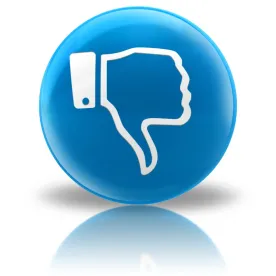An anonymous internet troll takes a shot at your organization via Twitter or Facebook, arousing your ire and a desire to both set the record straight and put someone in his or her place. You prepare the perfect retort complete with just the right amount of sarcasm, or even just a sternly-worded warning for the offender. What happens next is how organizations can suffer the most online reputational damage - clicking the mouse to post or tweet the response. This is precisely the point to step back, delete the potential post and reconsider your strategy for responding to online attacks. The new reality for organizations and brands is that the social media audience has as much control over the message as the speaker, and similar to those who watch NASCAR hoping to see crashes, the social media audience loves nothing more than a meltdown.
There are a number of ways an organization can come under fire on social media or the internet in general, and while some may be prompted by organizational action or inaction, sometimes attacks can come unprovoked. Dissatisfied clients, unhappy business associates,competitors and disgruntled employees all have the ability to post critical and very public messages. Anonymous internet users can openly criticize the organization for perceived bad acts or policies. Online attacks to reputation can also rise to the level of actual defamation, and can come about through standard social media such as Facebook or Twitter, or in the form of false reviews on review sites such as Yelp, UrbanSpoon, or Angie's List. They can even wind up as complaints on legitimate consumer protection sites such as the one run by the Better Business Bureau. Some attacks are the result of internet trolls - users who seek to incite arguments or controversy merely for the fun of provocation itself.
The urge to immediately respond to every one of these attacks or criticisms is strong, but an immediate and visceral response will often play into the exact scenario the organization was hoping to avoid - excessive negative publicity and the contortion of the organization's intended message. A negative knee-jerk reaction will only escalate the tension between the organization and the social media audience. For example, one of the most memorable social media disasters in recent years came from a restaurant known as Amy's Baking Company. The restaurant received an extremely unflattering portrayal on a reality show meant to highlight ways in which restaurants in trouble could turn their fortunes around. After the episode aired, viewers incensed at what they had seen (as well as regular trolls looking to create chaos) began to post negative comments on the restaurant's Facebook page. At this point, rather than weather the storm brought about by what was probably a bad decision to appear on a reality show, someone began responding to the critics on Facebook in a series of all-caps rants. The couple who ran the restaurant claimed the page was hacked, but subsequent posts by the couple didn't differ substantially in content or tone, lambasting the critics and stoking the fires of the online controversy. Until that point, it was likely that the only people aware of the restaurant on a large scale were viewers of the show. In response the couple's reaction, however, negative posts began to spread virally from Facebook to Twitter to Yelp to attack the restaurant from every conceivable online corner. Reddit comment threads on the subject surged, and the visibility of the dispute reached every news aggregator on the internet. A series of off-the-cuff responses made out of anger turned what was likely a short-lived black spot on their reputation into a full-blown national online media spectacle, with coverage of the behavior in multiple media outlets. The debacle became a moment of schadenfreude for the entire internet and still exists on multiple lists of famous social media failures.
With that example in mind, the paramount question is whether your organization should respond to an online attack at all. Several factors will play into the decision to respond, and even though a quick response is often the best response, careful review of the factors on a case-by-case basis is a necessary component of your online communications with critics.
The first factor in the analysis should be, "What is motivating this attack?" Legitimate criticism, for instance, does merit a careful and thoughtful response rather than silence, especially if the commenter is angry. Organizations can get out in front of these sorts of issues through a thorough analysis of what might be potential problem areas. Organizations should know and anticipate their critics, as well as have a plan in place for response to certain types of criticism. Complaints of bad experiences or interactions should be dealt with in an apologetic and helpful manner, and are an opportunity to turn a negative interaction into a positive experience.
Another type of commenter is someone who is merely misinformed. Responding to these types of commenters requires respect when correcting the record with facts that may counter the commenter's point of view. No sarcasm or snark should be used when correcting factual inaccuracy, and a high degree of empathy should persist throughout the response. A public correction can be an embarrassing ordeal, so a gentle tone is incredibly important - a factual inaccuracy correction should be an offer of help, rather than a stinging public upbraid. If the misinformation persists, however, a firm statement of fact might help. Continued engagement should probably thereafter be met with silence.
If the criticism in the post is not a legitimate issue with the organization or the result of misinformation, the question of whether to remain silent or respond becomes more difficult. As a general rule, responding to true trolls on the internet only serves to embolden them. They are not expressing a true sentiment or acting out of misinformation - they are attempting to stir up trouble. Responding to these types of commenters, even in a balanced and rational way, might still serve to escalate the situation, as they will use any excuse to twist or change the message your organization might convey in order to bring attention to themselves. Those who are commenting just to insult the organization should probably be ignored, the same way other insulting communications should be ignored. Those who comment just to rage at the organization might also have a legitimate complaint, but it may become apparent that no amount or response will assuage their concerns, and silence is probably the best option in that scenario.
Finally, if an organization does choose to respond, both the tone and the amount of response are crucial. A negative response to a negative post will garner the wrong kind of attention, especially if the poster has a legitimate complaint. As mentioned above, response should never insult the commenter, even if the commenter uses rude, insulting, sarcastic and angry language. A response to a negative post shouldn't come from an emotional reaction, and if you choose to respond to a negative social media or internet post, question your own motivations for doing so. Even the most carefully-crafted response to a critic, however, can suffer from repetition or from continued response. Continued engagement with a negative commenter, legitimate or otherwise, might only lead to drawing the issue out, thus drawing more unwanted attention. Unless the engagement with an online critic becomes a thoughtful dialogue of mutual respect, the conversation is likely not headed in a beneficial direction.
Social media and online forums are areas where reputations can be forged or broken before anyone knows what happened. The mentality of "fight fire with fire" is outdated in the new digital landscape, and maintaining control of the message in this environment relies heavily on anticipation, moderation and consistency. Before you fire off that angry response, take a step back and consider how you can best serve your organization, then plan a response that achieves your goals, rather than satisfies your ire.



 />i
/>i

